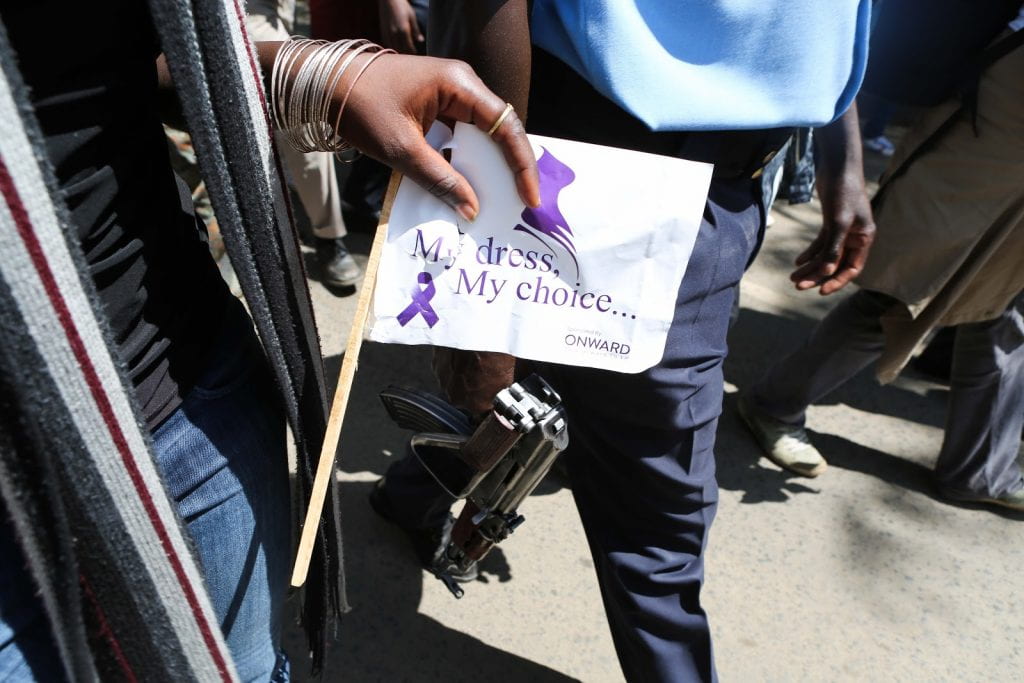This post is a guest blog written by Sarah Dickins and Naomi Mwaura from the Flone Initiative.
This September 2020, the world celebrates 25 years since the signing of the Beijing Declaration and Platform for Action, a landmark global agreement to recognise women’s and girls’ rights and end gender-based violence and discrimination across many intersectional areas of life. The Beijing Declaration continues to pave the way for further initiatives, conventions and frameworks for advancing gender justice around the world, including the UN Security Council resolution 1325 on women, peace and security, the International Day of the Girl Child and, more recently, the UN Women’s 2019 Generation Equality Campaign.
In the last two decades, we’ve seen an unprecedented rise in action, funding and research to end gender-based violence across governmental, civil society and private sectors.
But, in the experience of the Kenyan women-led organisation Flone Initiative and our colleagues, this attention is not evenly spread. There are still large gaps in practice, innovation and technology – even the ones that we engage with on a daily basis.
Mobile Technology and Women’s Mobilisation
One large gap that we see is in the use of information technology, like mobile devices, apps and other computer software, to address gender-based violence. The most obvious benefit of this approach is that mobile phones exist almost everywhere in the world. According to the mobile data research platform, GSMA Intelligence, there are over 5 billion unique mobile users globally. This is especially true for the Middle-Income contexts where Flone Initiative and most of our colleagues work; in early 2020, the Communications Authority of Kenya reported that there were 55.2 million SIM card subscriptions – nearly 4 million more than the total population of Kenya.
Although women in these contexts are less likely to own and use a mobile device than men, GSMA analysis also shows that 1.2 billion women in Lower and Middle-Income Countries have a phone, rising from 44% to 55% between 2017 and 2019. It is hardly surprising that many gender-based violence campaigns have emerged and gained traction on social media, from the global #MeToo movement, to the Kenyan ‘My Dress, My Choice’ campaign that was co-created by Naomi Mwaura, the Founding Director of Flone Initiative. GSMA analysis also shows that most women with a smartphone feel it makes them safer, whilst recent research from the University of Oxford that mobile technology can support gender equality by increasing women’s awareness of sexual and reproductive health and rights, as well as allowing women to connect and share experiences with each other. Although we haven’t found data on this yet, these trends seem likely to continue during social distancing measures of the global Covid-19 pandemic.

We find it strange, then, that so little is known about using mobile technology to end gender-based violence. One 2019 review of academic scholarship revealed only 23 systematic studies of the effectiveness of so-called mobile health, or mHealth, interventions – of which, none were concerned with gender justice and a small minority focused on data from the Global South. Flagship research on gender-based violence, such as the DFID-funded What Works series, also frequently omits tech-based interventions from their evaluations.
Report It! Stop It!: A Kenyan Response
Recognising this gap, Flone Initiative and a team of colleagues from gender equality and software development sectors have created our new ‘Report It! Stop It!’ (RISI) mobile app. This is the first app designed for and by Kenyan women to track incidents of gender-based violence on and around public transport.
‘Report It! Stop It!’ is completely free to download and use, and aims to create a safe space for anyone who survives or sees violence to share their experiences. By allowing users to pin incidents on a geomap of public transport routes, providers and related spaces, our app visually tracks the hotspots of violence across Kenya so that individuals can make safer travel choices. We also aim to report on this data to inform public policy-makers, think tanks and other civil society partners of trends in gender-based violence across Kenya, with a view to shaping more effective laws, policies and interventions nationwide.

We’re so excited to launch this app, as we’ve worked for over 18 months to innovate a unique mobile service that responds to the complex realities of gender-based violence in Kenya. Firstly, this app is arguably more accessible than location-specific gender-based violence interventions. 86% of Kenyan women have a mobile device, and the ‘Report It! Stop It!’ needs only a single download, takes up minimal memory and is affordable, as it consumes little mobile data.
When designing the app, we were guided by Flone Initiative’s original 2018 research into violence on public transport. The results were shocking: 76% of female transport operators (drivers and conductors) have either experienced or witnessed sexual harassment. Survivors of gender-based violence in public transport were also reluctant to report due to the lack of clear reporting mechanisms. We responded to these realities in the app design, by giving users the flexibility to report these experiences quickly, anywhere and any time they have an internet signal – even days or months after the incident. Details of the main Kenyan transport routes and providers are already integrated into the interactive map, so that users can easily detail their experiences.
But the design process wasn’t always simple, not least because of the limited research and guidance available. Many of the apps we reviewed during the design process were unsuitable for the Kenyan context; they either only provided maps and links to support services in North America and Europe or had lots of paid features. As such, we worked hard to ensure that the app met high safety and accessibility standards relevant to the Kenyan context.
We’re also proud to have designed an app in which reports are easy to generate, regardless of users’ language abilities or knowledge of gender-based violence. People can submit voice recordings describing the incident, either instead of or alongside written notes. We have also included symbols of types of violence, locations and other information, to guide users with different literacy levels in submitting their reports.

At its heart, this process has helped our diverse, cross-organisational team to grow and work together innovatively. It continues to teach us the creative power of synergies between gender equality organisations and software specialists, including our colleagues at SafetiPin, an Indian social organisation that guided our data mapping of public safety in Mombasa, Kenya’s second city. We also worked closely with our dedicated app software engineer to make sure that the app responded to the sensitive intersections of gender-based violence, whilst also allowing for consistent and ethical data collection.
So are mobile apps an answer to gender-based violence? With careful design, they can be. Through our ‘Report It! Stop It!’ app, we aspire to offer an accessible, innovative and impactful approach to ending gender-based violence. But tech-based interventions like ours must be supported by strong data collection, analysis, and further policy and programmes. Our sector also needs much more collaboration with other women’s rights organisations and software specialists, so that tech-based interventions deliver contextually tailored support to their most important user: the survivor of gender-based violence.
The ‘Report It! Stop It!’ app will be available to download from the Google Play Store from September 2020. A previous web-based version of the app and more information are available on the Flone Initiative website.
Sarah Dickins has worked in youth and gender justice strategy and programmes evaluation in Europe, South America and East Africa since 2015. She holds an MA Gender, Violence and Conflict from the University of Sussex (Department of International Development) and was Programmes Consultant for Flone Initiative during 2019, leading on the development of the ‘Report It! Stop It!’ mobile app and M&E approaches to Flone Initiative’s gender-based violence programming and feminist safeguarding procedures. Sarah currently works in data-driven organisational change for the girls’ rights INGO Plan International.
Further discussion and feedback on this article or the ‘Report It! Stop It!’ app is always welcome; please connect with Sarah via Twitter at https://twitter.com/srhdckns.
Naomi Mwaura is the Founding Director of Flone Initiative, an organisation working to create a safe and professional public transport industry in Kenya. She was one of the lead organisers of the MyDressMyChoice campaign that saw thousands of women protest gender-based violence in the Kenyan public transport. She has been involved in the development of the Cairo Bus Rapid Transit (BRT) Gender plan and study on expanding access to cycling for women in Cairo. As part of Mandela Washington Fellowship for Young African Leaders, Naomi completed a civic leadership fellowship at Tulane University, USA. She was named “BBC 100 Inspirational and Influential Women” 2017 and featured in Forbes Women, BBC and Aljazeera. She is among the winners of the 2018 Ashoka Challenging Norms, Powering Economies Challenge. You can find her on Twitter.



[…] 5. Mobile Tech: An Answer to Gender-Based Violence? […]
This is very good post.